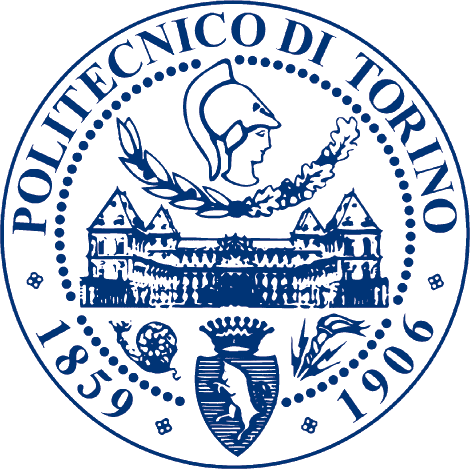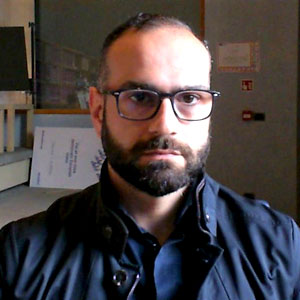Samir Musa
- Historical Archives of the European Union
- https://www.eui.eu/Research/HistoricalArchivesOfEU
Il modello del servizio per la conservazione digitale a lungo termine, l'accessibilità e l'interoperabilità degli Archivi storici dell'Unione europea
 Samir Musa si è laureato nel 2003 in Scienze librarie e archivistiche e si è specializzato nella gestione e trattamento degli archivi digitali con una tesi sul modello OAIS (Open Archival Information System). Ha collaborato con il progetto finanziato dall’Unione europea, ERPANET (Electronic Resources and Permanent Access NETwork) e ha lavorato come consulente presso enti pubblici e privati, nel campo della conservazione a lungo termine degli archivi digitali.
Nel settembre 2012, ha conseguito la posizione di Digital Records Manager presso gli Archivi storici dell’Unione europea, che fanno parte dell’Istituto universitario europeo a Firenze.
Samir Musa si è laureato nel 2003 in Scienze librarie e archivistiche e si è specializzato nella gestione e trattamento degli archivi digitali con una tesi sul modello OAIS (Open Archival Information System). Ha collaborato con il progetto finanziato dall’Unione europea, ERPANET (Electronic Resources and Permanent Access NETwork) e ha lavorato come consulente presso enti pubblici e privati, nel campo della conservazione a lungo termine degli archivi digitali.
Nel settembre 2012, ha conseguito la posizione di Digital Records Manager presso gli Archivi storici dell’Unione europea, che fanno parte dell’Istituto universitario europeo a Firenze.
 Samir Musa graduated in 2003 in Archival Science and Records Management and specialised in the digital archives management and preservation with a thesis on the OAIS (Open Archival Information System) Model. He collaborated with an EU-funded project, ERPANET (Electronic Resources and Permanent Access NETwork) and worked as a consultant in both the private and public sector, in the field of long‐term preservation of digital records.
In September 2012, he was appointed Digital Records Manager in the Historical Archives of the European Union which forms part of the European University Institute in Florence (Italy).
Samir Musa graduated in 2003 in Archival Science and Records Management and specialised in the digital archives management and preservation with a thesis on the OAIS (Open Archival Information System) Model. He collaborated with an EU-funded project, ERPANET (Electronic Resources and Permanent Access NETwork) and worked as a consultant in both the private and public sector, in the field of long‐term preservation of digital records.
In September 2012, he was appointed Digital Records Manager in the Historical Archives of the European Union which forms part of the European University Institute in Florence (Italy).
SESSIONE 8. Conservazione e riuso dei dati digitali
Il modello del servizio per la conservazione digitale a lungo termine, l'accessibilità e l'interoperabilità degli Archivi storici dell'Unione europea
 Gli Archivi storici dell’Unione europea (ASUE), siti a Firenze (Italia), sono un centro di ricerca dedicato alla conservazione archivistica e allo studio dell’integrazione europea ma soprattutto sono la sede degli archivi ufficiali che conservano i documenti storici delle Istituzioni europee
Inoltre, gli ASUE ospitano piú di 150 depositi privati prodotti da eminenti politici europei, movimenti e associazioni europee, nonché collezioni documentarie riguardanti l’integrazione europea e provenienti dagli Archivi nazionali e dai Ministeri degli Affari Esteri.
Gli ASUE furono stabiliti in base ad un accordo del 1984 fra la Commissione europea, che agiva a nome di tutte le istituzioni comunitarie, e l’Istituto universitario europeo (IUE).
Il patrimonio documentario consta non solamente di un nucleo maggioritario di documenti cartacei ma anche di collezioni digitalizzate e native in ambiente digitali che si sono accumulate negli anni piú recenti e comprendono documenti testuali, audio, immagini e video.
Per tale ragione, gli ASUE a partire dal 2016 hanno promosso il progetto DAMS (Sistema di gestione degli archivi digitali) che ha la finalità sia di fornire un sistema idoneo e affidabile per la conservazione a lungo termine della memoria digitale sia di garantire un servizio di accesso alle collezioni trasferite a Firenze.
Questi risultati sono stati ottenuti grazie alla cooperazione proattiva fra le istituzioni UE e gli ASUE i quali hanno svolto un ruolo chiave nel coordinamento e nell’armonizzazione degli sforzi, soprattutto nel trattamento e nella pubblicazione di dati e contenuti archivistici complessi provenienti da tradizioni archivistiche completamente differenti (sia in termini di descrizione sia nella compilazione delle liste di autorità).
Il Piano di conservazione e la sua gestione si sono quindi rivelati di fondamentale importanza al fine di conservare nel lungo termine non soltanto i contenuti digitali ma anche la stessa autenticità ed affidabilità del deposito archivistico digitale, grazie ad una consistente documentazione diffusa, efficace e tracciabile.
Gli Archivi storici dell’Unione europea (ASUE), siti a Firenze (Italia), sono un centro di ricerca dedicato alla conservazione archivistica e allo studio dell’integrazione europea ma soprattutto sono la sede degli archivi ufficiali che conservano i documenti storici delle Istituzioni europee
Inoltre, gli ASUE ospitano piú di 150 depositi privati prodotti da eminenti politici europei, movimenti e associazioni europee, nonché collezioni documentarie riguardanti l’integrazione europea e provenienti dagli Archivi nazionali e dai Ministeri degli Affari Esteri.
Gli ASUE furono stabiliti in base ad un accordo del 1984 fra la Commissione europea, che agiva a nome di tutte le istituzioni comunitarie, e l’Istituto universitario europeo (IUE).
Il patrimonio documentario consta non solamente di un nucleo maggioritario di documenti cartacei ma anche di collezioni digitalizzate e native in ambiente digitali che si sono accumulate negli anni piú recenti e comprendono documenti testuali, audio, immagini e video.
Per tale ragione, gli ASUE a partire dal 2016 hanno promosso il progetto DAMS (Sistema di gestione degli archivi digitali) che ha la finalità sia di fornire un sistema idoneo e affidabile per la conservazione a lungo termine della memoria digitale sia di garantire un servizio di accesso alle collezioni trasferite a Firenze.
Questi risultati sono stati ottenuti grazie alla cooperazione proattiva fra le istituzioni UE e gli ASUE i quali hanno svolto un ruolo chiave nel coordinamento e nell’armonizzazione degli sforzi, soprattutto nel trattamento e nella pubblicazione di dati e contenuti archivistici complessi provenienti da tradizioni archivistiche completamente differenti (sia in termini di descrizione sia nella compilazione delle liste di autorità).
Il Piano di conservazione e la sua gestione si sono quindi rivelati di fondamentale importanza al fine di conservare nel lungo termine non soltanto i contenuti digitali ma anche la stessa autenticità ed affidabilità del deposito archivistico digitale, grazie ad una consistente documentazione diffusa, efficace e tracciabile.
The service model for Long Term Data Preservation, accessibility and interoperability at the Historical Archives of the European Union
 The Historical Archives of the European Union (HAEU), located in Florence (Italy), is a research centre devoted to the archival preservation and study of European integration.
The HAEU is mainly the official archives for the historical documents of the Institutions of the European Union and hosts more than 150 private archival deposits by eminent European politicians, movements and associations as well as a collection of documents concerning European integration from National Archives and Ministries of Foreign Affairs Archives.
The HAEU was established following an agreement in 1984 between the European Commission, acting in the name of all the other Community institutions, and the European University Institute (EUI).
The archives consists of not only paper-based collections but also both digitized and digital assets that especially in the last years increasingly took place into the HAEU collections.
For this reason, the Historical Archives of the European Union (HAEU) started the DAMS (Digital Archives Management System) project in September 2016 with the goal to provide the HAEU with both an appropriate preservation and access service system of the digital collections produced by and transferred to the HAEU.
These achievements have been reached thanks to a proactive cooperation between the EU institutions and the HAEU which played a key role in coordinating the efforts and in harmonising, treating and publishing complex archival data and contents produced by partners with totally different archival traditions (both in their description and authority records).
Hence, the Preservation Planning has been the essential component in order to keep digital content alive over time and to ensure authenticity and trustworthiness in digital repositories, thorough proper documentation and effective traceability.
The Historical Archives of the European Union (HAEU), located in Florence (Italy), is a research centre devoted to the archival preservation and study of European integration.
The HAEU is mainly the official archives for the historical documents of the Institutions of the European Union and hosts more than 150 private archival deposits by eminent European politicians, movements and associations as well as a collection of documents concerning European integration from National Archives and Ministries of Foreign Affairs Archives.
The HAEU was established following an agreement in 1984 between the European Commission, acting in the name of all the other Community institutions, and the European University Institute (EUI).
The archives consists of not only paper-based collections but also both digitized and digital assets that especially in the last years increasingly took place into the HAEU collections.
For this reason, the Historical Archives of the European Union (HAEU) started the DAMS (Digital Archives Management System) project in September 2016 with the goal to provide the HAEU with both an appropriate preservation and access service system of the digital collections produced by and transferred to the HAEU.
These achievements have been reached thanks to a proactive cooperation between the EU institutions and the HAEU which played a key role in coordinating the efforts and in harmonising, treating and publishing complex archival data and contents produced by partners with totally different archival traditions (both in their description and authority records).
Hence, the Preservation Planning has been the essential component in order to keep digital content alive over time and to ensure authenticity and trustworthiness in digital repositories, thorough proper documentation and effective traceability.












